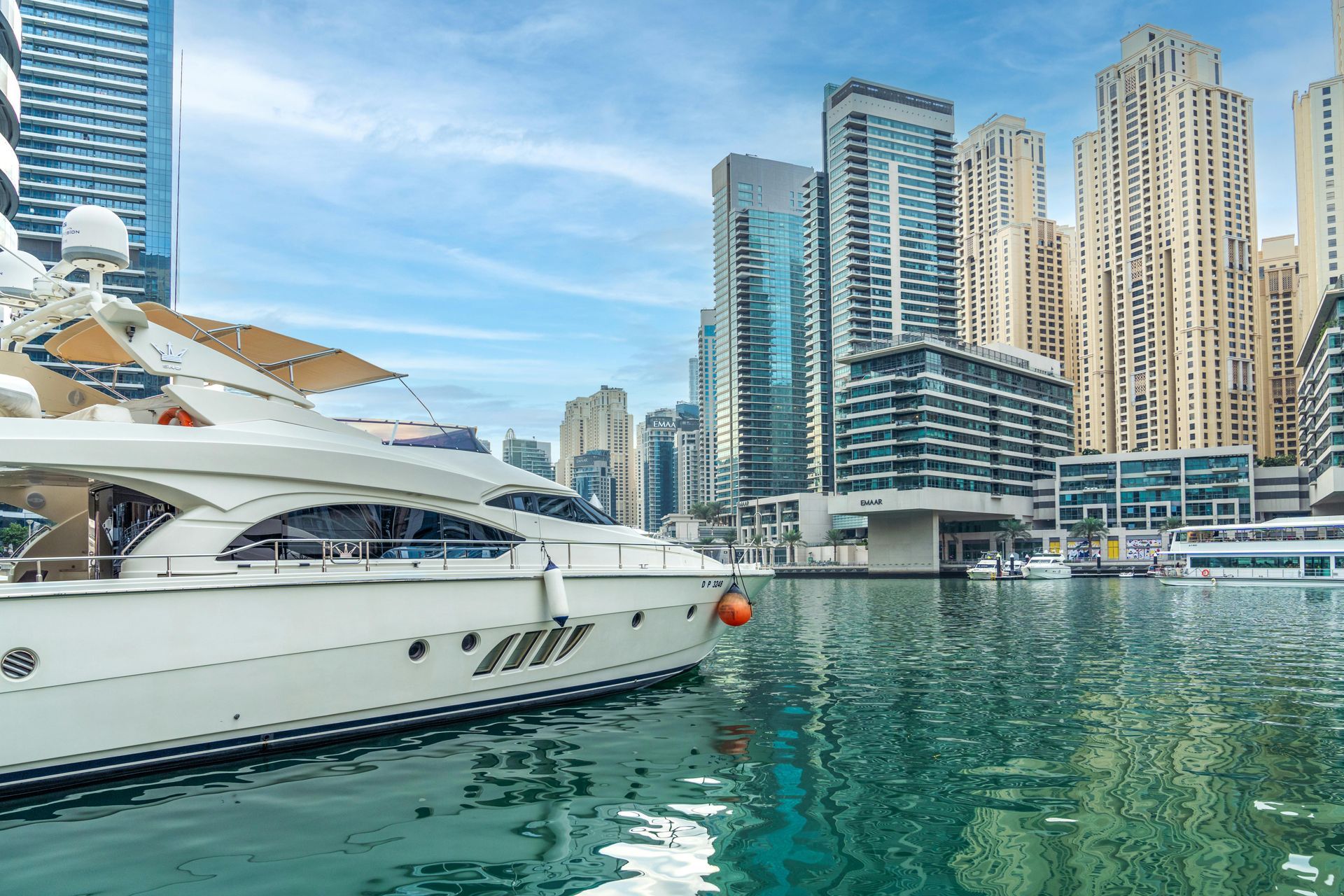The UAE: 2025’s Top Wealth Magnet for Millionaires
February 7, 2025

In 2025, the UAE is set to solidify its reputation as the ultimate destination for wealth, attracting an estimated 6,700 millionaires to its shores. This surge in high-net-worth individuals (HNWIs) is positioning the UAE as the premier global hub for the affluent, surpassing long-established wealth centres like the UK and the US. If you’re looking to relocate to Dubai or invest in the region, now is the perfect time to look at the opportunities it has to offer.
Contact Us
What are the benefits of moving to the UAE?
The UAE has become the go-to location for millionaires, and it’s not hard to see why:
Tax Benefits:
With no income tax and no inheritance tax, the UAE has a compelling financial advantage. If you are looking to maximise your wealth, these tax policies provide a rare opportunity to preserve and grow your assets.
Lifestyle Excellence:
Cities like Dubai and Abu Dhabi offer an exceptional lifestyle, from world-class healthcare and top-tier international schools to luxury living and fine dining. Whether you're interested in high-end real estate or enjoying a cosmopolitan lifestyle, the UAE delivers in every aspect.
Stability and Security:
In a world where economic and political volatility are increasingly common, the UAE’s robust political stability and thriving economy offer peace of mind. For those seeking a secure environment for both their wealth and family, the UAE stands as a beacon of certainty.
The Impact on the Economy
As more millionaires relocate to Dubai and other cities, the economic impact is clear:
Real Estate Demand:
Luxury property prices in Dubai have already seen a 10% rise in 2024, and with more HNWIs moving to the UAE, demand for high-end real estate will continue to grow. This makes the UAE an attractive location for both investment and personal residence.
Sector Growth:
Industries such as financial services, hospitality, and luxury retail are all expanding rapidly. With more wealth coming into the region, these sectors are being reinforced to meet the needs of the growing affluent population.
Wealth Management Expansion:
As millionaires settle in the UAE, the demand for sophisticated wealth management solutions is increasing. This provides unique opportunities for financial planners and wealth managers to help you optimise your portfolio in a tax-advantaged environment.
The Challenges Ahead
The rapid influx of wealth does come with its challenges:
Infrastructure Strain:
As more millionaires relocate, the pressure on the UAE’s infrastructure intensifies. From transportation to housing, ensuring that the region can accommodate this growing population is a key focus for local authorities.
Environmental Impact:
As urbanisation accelerates, sustainable growth practices will be critical to minimising the environmental footprint. The UAE is already taking steps to address this, but managing growth responsibly remains an ongoing challenge.
Social Equity:
With wealth flowing into the region, the potential for inequality exists. It’s essential for policies to address this disparity, ensuring that the economic benefits are shared broadly while maintaining the UAE’s global competitiveness.
Conclusion
The UAE is well on its way to becoming the world’s foremost destination for wealth in 2025. Whether you’re considering relocating to Dubai, diversifying your investments, or looking for tax-efficient wealth planning solutions, the UAE’s combination of stability, tax advantages, and high-quality lifestyle options makes it an unparalleled choice. For those serious about securing their financial future and enjoying a prosperous life in one of the world’s most dynamic economies, now is the time to act.
The UAE’s rise as a wealth magnet underscores its strategic appeal. If you’re considering relocating or investing in the UAE, reach out for expert financial advice.

By Andy Wood
•
April 1, 2025
For over two centuries, the UK’s non-domiciled tax regime and its remittance basis has been a cornerstone of tax planning for wealthy expats and international families. It was introduced, along with income tax, by Willian Pitt the Younger at the very end of the 18th century. It was part of the fiscal firepower necessary to battle Napoleon Bonaparte. And, like income tax, it had pretty much been a constant feature of the UK’s system ever since. But in March 2024, the then Chancellor, Jeremy Hunt, rang the death knell for the remittance basis, with Labour’s Rachel Reeves – who would succeed Hunt a few months later - declaring she would have abolished it anyway. The end is therefore very much nigh for the UK’s non-dom tax regime. More specifically, the end is 6 April 2025. However, out with the old and in with the new’ goes the saying. As such, the ‘what comes next’ will reshape the tax landscape for non-doms, expats, and international investors with a UK footprint (or those considering creating one). What is Domicile (and Non-Domicile)? Domicile is not a straightforward concept like tax residence. The latter is largely about physical presence (or otherwise) in a particular. Instead, as well as physical presence, it also requires an understanding of your future intentions. Is a place somewhere that you intend to live permanently or indefinitely. There are two main types of domicile that I will discuss here: • Domicile of origin: This is inherited at birth, usually from your father (if you think that is misogynistic then I don’t make the rules, OK?). You do not lose your domicile of origin. However, think of it as the foundations of a building. You can a domicile of choice on top it. • Domicile of choice: You build a new domicile of choice by achieving two things. Firstly, by physically residing in place and, secondly, by forming the intention to stay in that same place permanently or indefinitely. Both must be present.

By Andy Wood
•
March 26, 2025
So you’ve left the UK for pastures new. The sun is shining. You're making more money. You’re enjoying a great quality of life in a new country. In fact, you’re totally de-mob happy. Even better, as a non-UK resident, UK taxes are a dim and distant unpleasant memory, right. Right? Wrong. I don’t necessarily see my role in life as chief balloon popper. However, there are some Uk tax things you should bear in mind before declaring yourself a tax exile. Am I really non-UK Resident (“NR”)? Up until 2013, the UK didn’t really have a statutory definition of residence for tax purposes. Yes, that’s as crazy as it sounds. Fortunately, the Statutory Residence Test (“SRT”) was introduced from 2013. The idea is that it provides a degree of objectivity through a series of tests. Although a statutory test, other than in straightforward cases, it can still remain complex.

Mosaic Chambers Group is a trading style of Mosaic Chambers FZ LLC
BUSINESS CENTER 05,
RAKEZ BUSINESS ZONE FZ
Email us
info@mosaicchambers.com
© 2025
All Rights Reserved | Mosaic Chambers Group LLC | Privacy Policy